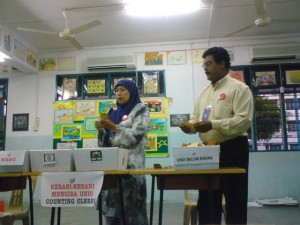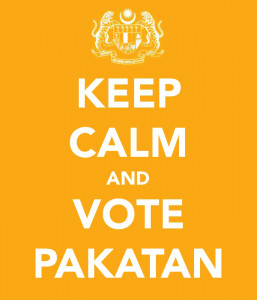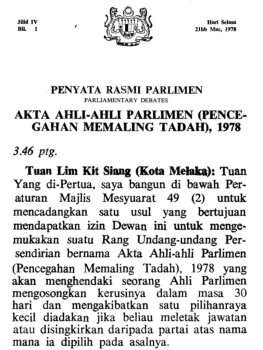In every election, polling and counting agents (PACAs) plays a crucial but underrated role. Here we run through some of the things they do and why PACAs are important.
Why are they important
 When a PACA is present at a polling station, the voter is assured his vote will be confidential and accounted for, hence vote boldly. With an opposition PACA present, the Election Commission (EC) staff and workers will be more likely to carry out their duties impartially and honestly.
When a PACA is present at a polling station, the voter is assured his vote will be confidential and accounted for, hence vote boldly. With an opposition PACA present, the Election Commission (EC) staff and workers will be more likely to carry out their duties impartially and honestly.
Why PACA
The EC has rules and guidelines on what is allowed and disallowed for the conduct of the polling and counting of votes. However, some of the Election or Returning Officers (RO), may not have had adequate training to conduct the vote polling and counting process correctly, procedure-wise.
The PACAs need to spot polling and counting process irregularities and raise the objections where necessary. This is one of their main concerns.
Duties
A PACA needs to check if the voter’s details agrees with the identification cards (IC) presented (i.e. same age range, racial features, sex) and that he has not yet voted (i.e. voter has indelible ink mark on his fingers). PACAs need to ensure that the voter polls without harassment or prompting from around the room, and the voting process be done smoothly and confidentially.
The polling agent needs to focus on what goes on in and around the polling centre and ensure that there are no suspicious movements around the area. If there is any suspicious happening, he is immediately to inform his election agent or party and request for the polling process to be stopped.
As for the counting agent, it is a continuation of the polling process that took place during the day. He is there to observe that the vote counting process is done according to the procedures, impartially and with no interference from outside parties.
Similarly, he also has to observe and ensure that there are no suspicious activities happening around the counting centre that would affect the counting of the votes. If it happens, he needs to inform his election agent and request for the counting process to be stopped. In case any votes become disputable, he should strive to ensure his party gets the vote.
Be a PACA today!
Most opposition candidates don’t have enough PACAs to monitor all their voting stations. Often times PACAs are the ones that make a difference on election contests won or lost. For anyone that desires to be a part of this fight for change, be a PACA today. Contact your nearest Pakatan party’s branch and sign up to be one.
A PACA’s challenge
Opposition parties are at severe disadvantages vis-a-vis BN. For rural states such as Sarawak, some people have to travel by airplanes, motorboats and four-wheel drives to reach the longhouses to be PACAs. It can be an expensive endeavour.
Sometimes, opposition PACAs have had problems with partisan ROs who refused to issue Form 14 (results certifying form) to them. The PACA would not be able to inform his party in time.
Often times opposition parties are dependent on volunteers to fill their PACA posts. Usually there is only one opposition PACA per polling voting stream i.e. no back up PACA.
It can be challenging for the onsite PACA to convey any news of discrepancy he found at the polling centre to his election agent to take the necessary actions. Every polling stream needs at least two PACAs and a runner to be on standby to follow the ballot box (if necessary) to the counting centre.
Postal voting
According to DAP PACA trainer Mary Josephine, the postal voting by the civil servants on duty for polling day is often riddled with discrepancies and controversies. “EC helpers’ names are displayed on the electoral roll. They are also listed as postal voters. A PACA has to ensure they don’t vote again on the day of polling.”
Postal votes have been a bane for opposition parties in the past. However with effort put in to monitor the process, DAP has begun to obtain some postal votes in GEs and by-elections. In the 2011 Sarawak state elections, DAP received 60 postal votes in the Dudong and Bukit Assek state seats. In the 2008 GE, both state seats provided 14 postal votes in total.
Keep checking your voting status!
 Ahmad, who had voted at a voting centre in his residential garden in the past few GEs suddenly finds out on polling day that he is now a voter in a constituency across the state. “Why have I been transferred to vote in another place without notified about it?” In a dash to get there, he gets frustrated because he can’t find the polling station. So he gives up.
Ahmad, who had voted at a voting centre in his residential garden in the past few GEs suddenly finds out on polling day that he is now a voter in a constituency across the state. “Why have I been transferred to vote in another place without notified about it?” In a dash to get there, he gets frustrated because he can’t find the polling station. So he gives up.
Sounds familiar? According to the Minority Report of the Parliamentary Selected Committee (PSC) on electoral process improvement submitted by the PR representatives in 2012, from March 2008 to September 2011, Election Commission (EC) has moved 31,294 electors out of their state and parliamentary seat where they have voted in the 12th GE without their consent.
EC said that this is to enable them to re-delineate the electoral boundary to what it should be by using the Section 7 in the Elections Act for re-delineating electoral area and locality. According to the PR representatives such partiality is illegal and they have requested the EC to return voters to their previous electorate division. However the government and EC has dismissed the minority report and refused to remedy the issue.
Plainly, it is illegal for EC to move your electoral districts without informing you. However what matters is that the voter gets to cast his vote in the end. During polling day there are no time to determine the legality of the issue, as anecdotal examples have shown that voters have been moved out of their state which is illegal.
According to Mary Josephine, “in the past many DAP supporters were moved to another constituency without being notified. As a result many chose either not to vote or to cast votes to a certain party.”
What if the voter wants to pursue a legal recourse against the EC? “It is up to the individual. He or she has to bear in mind that it may take a long time for the issue to be resolved.”
“Our advice to all voters is to constantly check their voting location, right till the last minute.” Voters can check their voting area by logging on to the website http://daftarj.spr.gov.my/.
“Whatever it is, keep calm, find your voting station and vote Pakatan Rakyat.” -The Rocket



